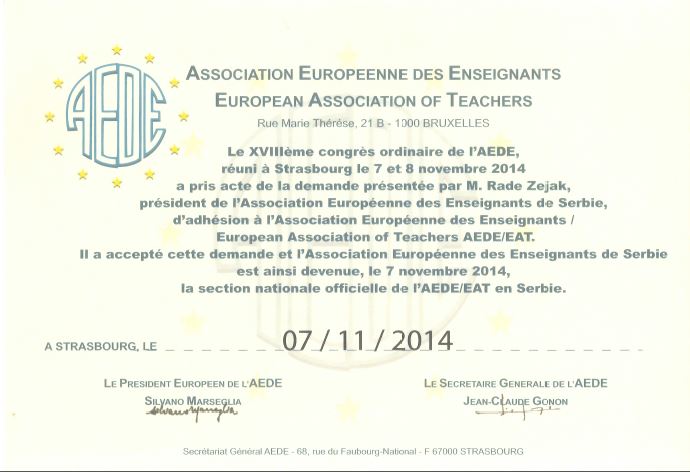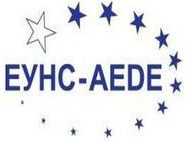European Association of Teachers of Serbia (EATS) was founded on February 28th, 2014 on a founding assembly held on the premises of the Sixth Belgrade High School. EATS is a professional association under the wings of AEDE (Association Européenne des Enseignants), that gathers national sections of European countries.
More than 30 colleagues and enthusiasts from Belgrade, and other cities in Serbia – Niš, Šabac, Novi Sad, Požega supported the Memorandum of Association, as well as the Statute of the Association that intends to introduce European heritage into the national education system, but also give the opportunity to our colleagues and students to follow the trends of education in Europe.
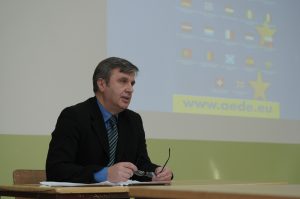 | 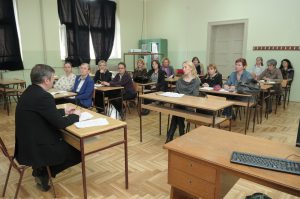 | 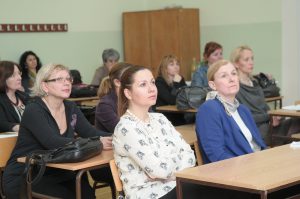 | 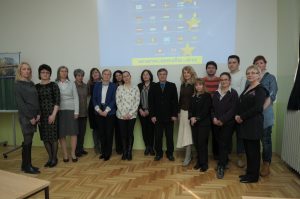 |
The goals of the European Association of Teachers of Serbia are:
- Promotion of the European idea and the need for European integration in the sphere of education;
- Strengthening the partnerships and cooperation among the EU education institutions and institutions of the Republic of Serbia;
- Improving the education system of the Republic of Serbia with promoting and application of the positive examples of education practice coming from national and European level;
- Organizing professional, scientific gatherings, congresses, national and international conferences with an aim to exchange experience and promote European ideas and standards in the field of education;
- Joining international partnership projects and their realization;
- Popularizing foreign language learning and meeting other cultures through student and teacher exchange;
- Exchange of experience and information on different education systems on the European continent;
- Raising awareness on principles and mutual goals of European culture lest both adults and youth could live together in a democratic and multicultural society;
- Raising awareness on just social and cultural politics to strengthen the public interest for the EU;
- Introduction to the functioning mechanisms of the EU’s institutions and structures;
- Promoting the idea of equality in Europe regardless of gender, ethnic origin, social and cultural background;
- Discovering the methods to induce the initiative acceptable to all respecting unity in diversity;
- Raising awareness about the common interest in the active role of the young for realizing mutual goals starting from local, national, European and global significance in the education system;
- Application and improvement of ICT in education.
Those listed above will be promoted through seminars, projects, international cooperation and other forms of exchange with colleagues from European countries.
Mr Rade Zejak, principal of the Sixth Belgrade Grammar School, was elected President of the EATS as the initiator of the idea stemming from successful contacts with the president of AEDE Mr Silvano Marseglia.
Daily experience and needs point to close cooperation with European institutions and this is an opportunity not to be missed for the sake of the future of our education.
Colleagues present at the Assembly offered many positive and constructive suggestions for the beginning of the EATS’ work, and members committed to promoting the idea in their region.
According to the regulations of articles 11. and 12. of the Law on Associations (). on the founding assembly of the European Association of Teachers of Serbia (EATS), held on February, 28th, 2014 in Belgrade, the following was adopted :
The Statute of the European Association of Teachers of Serbia
Article 1.
European Association of Teachers of Serbia is a non-governmental and unprofitable association founded for an indefinite period of time for achieving the objectives in the field of education.
Article 2.
The Association is apolitical, functioning independently and autonomously. The Association contacts and cooperates with other professional, scientific, cultural and other associations and organizations in-country and abroad.
The Association is free to join any international association as a national section, the decision of which is made by the Board of the Association.
The Association becomes a legal entity on the day of its registration and has all the legal rights and obligations attributed to such. The EATS has its stamp, logo, domestic and foreign currency account and all other attributes of a legal entity.
Article 3. The Title and the Seat
The title of the association is Evropsko udruzenje nastavnika Srbije, EUNS abbreviated.
The title in English is European Association of Teachers of Serbia, EATS abbreviated.
The seat of the Association is in Belgrade, at 33 Milana Rakica street. The Association functions on the territory of the Republic of Serbia.
The Board can decide on the change of the address of the seat for the sake of more efficient work, respecting all the legal obligations.
Article 4. The Stamp
The stamp of the Association is round, 32mm wide, with the text written in a circle around the acronym EUNS. The outer circle contains the text in cyrillic Evropsko udruzenje nastavnika Srbije, and Beograd in the bottom.
Article 5. Goals of the Association
1. Promotion of the European idea and the need for European integration in the sphere of education;
2. Strengthening the partnerships and cooperation among the EU education institutions and institutions of the Republic of Serbia;
3. Improving the education system of the Republic of Serbia with promoting and application of the positive examples of education practice coming from national and European level;
4. Organizing professional, scientific gatherings, congresses, national and international conferences with an aim to exchange experience and promote European ideas and standards in the field of education;
5. Joining international partnership projects and their realization;
6. Popularizing foreign language learning and meeting other cultures through student and teacher exchange;
7. Exchange of experience and information on different education systems on the European continent;
8. Raising awareness on principles and mutual goals of European culture lest both adults and youth could live together in a democratic and multicultural society;
9. Raising awareness on just social and cultural politics to strengthen the public interest for the EU;
10. Introduction to the functioning mechanisms of the EU’s institutions and structures;
11. Promoting the idea of equality in Europe regardless of gender, ethnic origin, social and cultural background;
12. Discovering the methods to induce the initiative acceptable to all respecting unity in diversity;
13. Raising awareness about the common interest in the active role of the young for realizing mutual goals starting from local, national, European and global significance in the education system;
14. Application and improvement of ICT in education.
Article 6. Field of work
In order to fulfil its goals the Association:
- Promotes its goals in public,
- Engages its members in projects that realize the programme of the Association to fulfil its goals,
- Independently or together with other organizations organizes domestic and foreign conferences, panel talks, seminars, councils, lectures and other forms of professional and public work,
- Cooperates with professional associations in education and other associations with similar goals and interests in-country and abroad.
Article 7. Membership
Members of the Association are its founders and persons who gained that right after the registration of the Association.
Members can be active or affiliated.
Active members are professionals in the teaching process or professional associates on all levels of the education system of the Republic of Serbia.
Affiliated members are students, donators, honorary members respecting the aims and activities of the Association.
To join the Association they need to agree with the aims and activities of the Association and to promote the same.
Article 8. Membership fee
The fee is paid annually. The amount is determined by the decision of the Assembly. Members are accepted after signing the application form containing the statement on accepting the Statute of the Association.
The application form is submitted to the Board of the Association.
The decision about the entrance is made by the Board with the majority of votes of present members and the applicant is immediately informed about it.
The conduct of members cannot be opposite to the goals adopted with this Statute and cannot, in any way, disturb its realization, nor ruin the image of the Association.
The membership is terminated by:
- Death,
- Stepping out of the Association,
- Not paying the fee,
- Or expulsion, on which the Board makes the decision after confirming that the conduct of the member has features of what is described in the previous paragraph.
It is possible to make a complaint on the decision from the previous paragraph to the Assembly of the Association within 15 days, and the decision of which is final and obligatory.
Article 9. Rights and obligations of the members
Member has a right to:
- To participate and realize the goals of the Association equally and together with other members,
- Immediately take part in decision-making in the Assembly, as well as to participate in it through the bodies of the Association,
- Elect and be elected for the bodies of the Association,
- Be promptly and completely informed on the work of the Association.
Member is obliged to:
- Actively contribute to realizing the goals of the Association,
- Participate, in the field of interest, in the activities of the Association,
- Pay the fee,
- Perform other jobs entrusted to him by the Board.
Article 10. Bodies of the Association
The bodies of the association are the Assembly and the Board.
Article 11. The Assembly
The Assembly of the Association is made of all its members.
The Assembly meets regularly once a year.
The extraordinary Assembly can be scheduled with a justified motion of the Board, as well as on the initiative of a third of the total number of the members. The initiative is submitted to the Board in a written form.
The Assembly is convened by the president of the Board with a written notice about the place and time of the meeting and the proposal of the Agenda. The Assembly is presided by the member publicly elected at the start of the meeting.
Article 12.
The Assembly:
- Makes the plan and programme of the activities,
- Adopts the Statute , as well as the changes and amendments to the Statute,
- Adopts other legal documents of the Association,
- Reviews and adopts the report made by the Board at least once a year,
- Reviews and adopts the financial plan and report,
- Elects and dismisses members of the Board,
- Adopts Rules of Procedure,
- Decides on other issues.
Article 13. The Assembly
The Assembly lawfully decides if a third of the members are present. If a third of the members is not present, a new Assembly meeting is immediately convened and it can decide even if the number of the present members does not make half of the membership.
The Assembly decides with the majority of votes of the present members.
The decision on the changes and amendments requires two-thirds of the present members´ votes.
Article 14. The Board
The Board is the executive body of the Association taking care of the realization of the Goals of the Association confirmed by the Statute.
The Board is made of five members elected and dismissed by the Assembly.
The Board elects the President and the Vice-President from its own ranks.
The President of the Board represents the Association in its legal work and a national and international level and has the rights and duties of a financial ordering party.
Vice-President is authorized to represent the Association in the absence of the President of the Board and sign all the financial and monetary documents on behalf of the Association.
The term of office of the Board members is four years and they can be reelected.
Article 15. The Purview of the Board
The Board:
- Runs the Association between two Assembly meetings and makes the decisions for the sake of realizing the goals of the Association,
- Organizes regular activities of the Association,
- Entrusts certain members with special tasks,
- Makes the decisions referring to financial management of the Association,
- Decides on putting in motion the procedure for making changes and amendments on its own initiative or on a proposal of at least five members and prepares the proposal of changes and amendments for the Assembly to adopt,
- Adopts Rules of Procedure,
- Creates assisting bodies according to the needs,
- Controls financial management and reports to the Assembly,
- Decides on other issues.
Article 16. The decision-making of the Board
The Board decides on other issues that other bodies of the Association are not authorized, either legally or by this Statute.
The Board lawfully decides if the majority of the members is present, and the decision is made with the majority of their votes.
Article 17. Meetings
The meetings of the Board are convened by the President with a proposed Agenda at least 72 hours before the meeting.
The meeting can be held by phone or internet if the urgency of the decision requires it.
The decisions are made by public voting, and in the case mentioned in the previous paragraph, voting is confirmed on the first regular meeting with the signatures of the members of the Board who voted.
Other issues on the work of the Board are regulated by the Rules of Procedure.
Article 18.
The work of the Association is public.
The Board takes care of regularly informing the membership and the public on work and activities of the Association, immediately, in electronic form or in form of internal, written publications, i.e. press releases.
Annual accounts and reports on activities of the Association are submitted to the members of the Assembly of the Association.
Article 19.
The Association´s means are gathered from membership fees, donations and gifts (in money or in goods), financial subventions, inheritance and the registration fee mean.
Article 20.
The work of the Association is terminated by the decision of the Assembly when the conditions for realizing the goals cease as well as in other cases provided by law.
Article 21.
In the case of the dismissal of the Association, the Assembly decides on electing the Committee for liquidation and appropriation of possible remaining means to other unprofitable organizations.
Presiding the founding Assembly of the association
Rade Zejak
